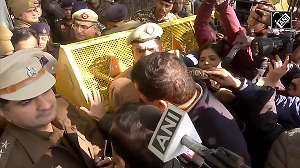A new phase in Indo-Japanese relations was heralded with an agreement between visiting Japanese Prime Minister Junichiro Koizumi and Prime Minister Manmohan Singh.
Japan urged India to consider a dedicated freight corridor along the Golden Quadrilateral railway project. The estimated cost of the project is likely to be around $5 billion (Rs 22,500 crore).
A joint declaration, called the eight-fold initiative, was also signed by the two prime ministers.
The freight project is proposed to be the jewel in the "eight-fold" crown and is envisaged as a dedicated multi-modal high-axle load freight corridor with a computerised train control system on the Mumbai-Delhi and Delhi-Howrah routes.
The project, built with inputs on Japanese technology and expertise, will utilise the Special Terms for Economic Partnership Scheme.
The eight-fold initiative envisages greater promotion of ministerial meetings, including defence, foreign, trade, finance and ICT ministers, with special emphasis on trade and petroleum.
A high-level strategic dialogue will also be launched between the two countries. The prime ministers will meet every year.
Economic and trade cooperation based on complementarities will be promoted and a joint study group has been directed to come up with its report in a year, focusing on measures required for a comprehensive expansion of trade in goods, trade in services, investment flows and other areas of economic relations between the two countries.
The joint declaration saw the two countries pledging to make a special effort to encourage not just government but foreign investment by Japanese companies in India.
An international engineering and technology fair will be organised by the Confederation of Indian Industry in 2007, actively assisted by Japan.
An ICT forum and encouragement to the ICT industries was also mooted. Overseas development assistance from Japan will continue to finance priority sectors like infrastructure and environment.
Shipping and aviation links would be strengthened, the joint declaration said, and added that "negotiations to revise the existing tax treaty will be concluded at the earliest possible date".
Japanese also conveyed its decision to support India's membership in the East-Asia Summit. The two countries pledged to work together to reform the United Nations and adopt a common approach at the World Trade Organisation.
The personal chemistry between the two prime ministers was palpable. Manmohan Singh recalled during his speech at the banquet in honour of Koizumi that in 1991, "When I was a finance minister, Japan played a very supportive role to help us tide over the economic crisis. It was a result of such friendly support that India was able to emerge from the crisis and subsequently embark on the path of economic reform that changed the face of the economy."
He also endorsed Japan's claim to a bigger role in the UN Security Council.
Earlier, at a lunch meeting organised by CII, Ficci and Assocham, Koizumi allayed fears of Indo-Japanese trade stagnating and asserted "it is growing and is heading on the right course".
Emphasizing that trade between the two countries had witnessed a quantum leap of 16 per cent last year over the previous year, Koizumi observed that about 300 Japanese companies had invested in India and more would in future.
Quoting a survey, he said, "We also learn that as a destination for Japanese businesses, India now ranks third after Korea and China."
He said, "It is important that such chances are further expanded in future", and added that other Japanese companies would share the success of Suzuki and other companies that set up shop in India.
The sun rises here







 © 2025 Rediff.com -
© 2025 Rediff.com -